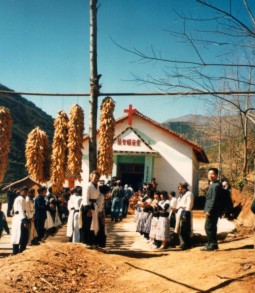| Chinese
churches during Communist rule. |
 |
|
Chinese
Christians outside of their church
|
Communist rule began
in China in 1949. In 1951 the government expelled some 10,000 foreign
missionaries, closing the era of western evangelism
in China. Many Chinese Christians, working with their new government,
created the "Three-Self Patriotic Movement" (TSPM) emphasizing self-government,
self-propagation, and self-support. Other Christians risked persecution
by continuing their worship and evangelism without government approval.
During the "Cultural Revolution" of 1966-1967 China was declared a religionless
state, and all religions suffered persecution in China. In the following
decades, Christians whose churches remained outside of TSPM suffered arrest,
beatings, prison terms, and destruction of Bibles and meeting places.
Since these unofficial Christians typically met in private homes, they
were called the "house church" movement. Traveling evangelists spread
Christianity outside of TSPM, till by the close of the twentieth century
the "house churches" included an estimated 50 million Christians.
|